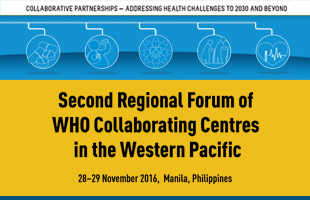
The World Health Organization (WHO) is holding the Second Regional Forum of WHO Collaborating Centres in the Western Pacific aimed at strengthening collaboration mechanisms across the Region. Representatives from more than 140 collaborating centres and 240 experts are meeting in Manila this week at the WHO Regional Office for the Western Pacific to review progress made since the inaugural forum in 2014, to share good practices, and to identify ways to support Member States in achieving the health-related Sustainable Development Goals.
WHO Regional Director for the Western Pacific, Dr Shin Young-soo, welcomed WHO’s "extended family" during his opening remarks, and reconfirmed that the "centres are indispensable in extending the Organization's reach to improve health outcomes in Member States".
What are WHO collaborating centres?
WHO collaborating centres such as research institutes or units within universities are designated by the WHO Director-General to carry out activities in support of WHO's programmes. Their activities range from providing laboratory services for issues of regional importance, to assisting in the development of global and regional norms, guidelines and standards, gathering and analysing data on regional issues, and providing country-specific support on request of WHO.
During the first forum, participants identified innovative ways to enhance partnerships between WHO and its collaborating centres. As a result, in the past two years, collaborating centres have formed and strengthened networks in several technical areas to align their activities with WHO priorities.
Across the Region, collaborating centres have been working with WHO to provide technical support tailored to the needs of Member States. For example, in the Republic of Korea, 19 collaborating centres contributed to efforts to strengthen quality assurance of traditional medicines, ensure vaccine safety and improve understanding of mental health issues among young people. Elsewhere, collaborating centres assisted with developing national policies on disability and community-based rehabilitation in the Lao People's Democratic Republic, on mining and health in Mongolia, and on asbestos-related diseases in Viet Nam. They have also contributed to capacity development, through accredited training of laboratory technicians across the Pacific and workshops to strengthen hospital quality and leadership and medical faculty motivation.




